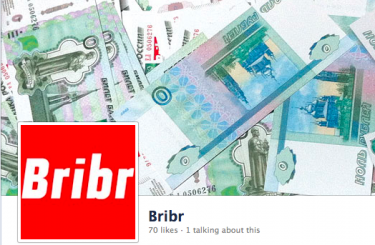Sunday, October 7, 2012
Bribr [ru; App Store, Facebook] is a newly-launched iPhone/iPad app that allows anonymous users in Russia to submit the locations and the amounts of the bribes they pay. Later, it will be possible to report on the bribes taken as well.
According to the Bribr Manifesto [ru],
[...] Doctors, the army, customs - in some cases bribes compensate for the low official salaries, in other cases the laws are written in ways that make it impossible not to violate them [...]. Sometimes we offer bribes ourselves, sometimes they are being extorted from us - but most often bribes are taken and given because this is how the system works. [...]

A screenshot of Bribr's Facebook page, featuring the most appropriate Russian currency for bribes: fake 0 ruble bills.
In 2011, Russia ranked 143rd out of 183 countries in the Corruption Perceptions Index, published by Transparency International.
The meter on the Bribr website [ru] currently shows that 1,795,295 rubles ($58,000) have been spent on bribes since Sep. 24. The website also has a map - and statistics on the "Who" and "What For" of the Russian bribing (the former contains 14 entries so far, with courts and traffic police topping the list).
The Bribr Manifesto states that the project is apolitical:
[...] The goal of Bribr is to show the numbers. Conclusions and opinions aren't our job. [...]
Members of the Bribr team, however, believe that knowledge and social responsibility are key to positive change, and in this context the post-election protests in Russia (GV coverage is here and here) are mentioned in the Manifesto:
[...] Everyone knows that bribery is common in Russia. But everyone had also known that falsifications did take place during the elections - and only when the observers showed on Dec. 4 how the votes were being stolen at several polling stations, only then did the people take to the streets. It is one thing to know that everyone is giving bribes and quite another to know just how much the 2nd Special Regiment of [the traffic police] is making [in bribes] on Rublyovskoye Shosse [aka Rublyovka, one of the priciest Moscow suburbs]. [...]
Bribr is not the only crowdsourcing platform tracking bribery and corruption out there.
Its currently dormant predecessor in the post-Soviet space - vzyatka.crowdmap.com [ru] - was launched by NewReporter.org/Internews [ru] in March 2011, but lasted only about two months and contains no more than 20 reports.
In India, there is the I Paid A Bribe crowdsourcing initiative, which was launched in August 2010 to "[encourage] people to not put up with official abuse of power and to report their stories of bribery to 'uncover the market price of corruption'” (GV text is here).
In May 2012, anti-corruption activists in Kenya launched their own I Paid a Bribe project, modeled after and in partnership with the Indian counterpart (GV text is here).
And in July 2012, Monitor de Corrupción [es] (”Corruption Monitor”) was launched in Colombia; according to IJNet, it uses a "two-tiered reporting system that allows both journalists and citizens to submit reports about corruption in their communities, municipalities and on a broader scale, regionally and nationally [...]."
Michael Idov, editor-in-chief of GQ Russia, commented on the Russian Bribr project on his Facebook page:
[...] If this thing works, the world will soon see a truly epic wiki-illustration of the breadth and depth of Russian corruption. [...]
No comments:
Post a Comment